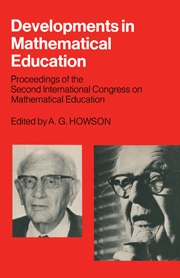 Developments in Mathematical Education
Developments in Mathematical Education from PART II - THE INVITED PAPERS
The future historian of mathematics will not fail to be amazed by the extent of the movement of the 1960s known as Modern Mathematics. This movement now appears to have reached its zenith, and the first signs of waning, a justifiably healthy reaction, are beginning to make themselves apparent. I should like, perhaps somewhat prematurely, to set forth in the manner of a balance sheet those things associated with this movement which should be retained, put in their proper place, or purely and simply eliminated. It is useless in such an issue to conceal the existence of preconceptions and of personal bias which cannot avoid influencing one's judgement. It is a question, not of knowledge nor of pedagogical technique, but of a field where the personal feelings of the mathematician cannot fail to play an essential role. Only dogmatic spirits (and they are not lacking among ‘modernists’) can believe that there is in these questions a truth capable of being logically established and before which one needs must bow. Consequently, I see this article as a ‘speech for the defence’ to be contributed to the debate and not a proof which one knows very well to be non-existent.
‘Modern Mathematics’ has a very complex origin and composition. One can say, broadly speaking, that it seeks the two fundamental objectives:
The pedagogical renewal of mathematics teaching
Exception is taken to the didacticism of traditional teaching, even its dogmatism, which is particularly evident – so one is assured – in the teaching of Euclidean geometry.
To save this book to your Kindle, first ensure no-reply@cambridge.org is added to your Approved Personal Document E-mail List under your Personal Document Settings on the Manage Your Content and Devices page of your Amazon account. Then enter the ‘name’ part of your Kindle email address below. Find out more about saving to your Kindle.
Note you can select to save to either the @free.kindle.com or @kindle.com variations. ‘@free.kindle.com’ emails are free but can only be saved to your device when it is connected to wi-fi. ‘@kindle.com’ emails can be delivered even when you are not connected to wi-fi, but note that service fees apply.
Find out more about the Kindle Personal Document Service.
To save content items to your account, please confirm that you agree to abide by our usage policies. If this is the first time you use this feature, you will be asked to authorise Cambridge Core to connect with your account. Find out more about saving content to Dropbox.
To save content items to your account, please confirm that you agree to abide by our usage policies. If this is the first time you use this feature, you will be asked to authorise Cambridge Core to connect with your account. Find out more about saving content to Google Drive.